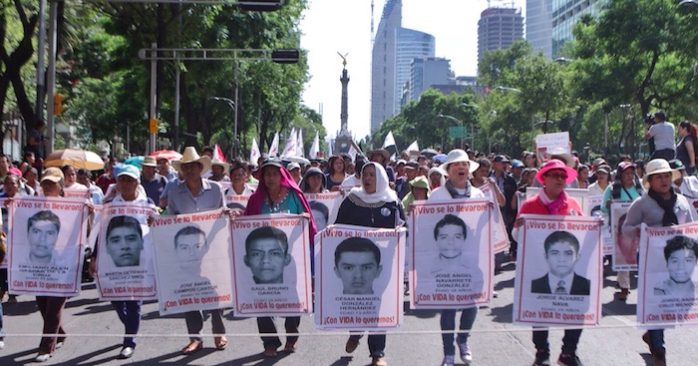
Relatives and classmates of the 43 march once again, 10 months since the disappearance of the teaching students of Ayotzinapa. Photo: Francisco Cañedo, SinEmbargo.
This article by Sergio Rincón was originally published [1] on Sin Embargo and is reproduced here under a partnership agreement [2].
Relatives, students and activists announced two caravans will travel across Mexico from the north and south starting July 31 with the goal of joining forces and calling on more Mexicans to join the search for the 43 missing students of the Escuela Normal Rural Raúl Isidro Burgos (Raúl Isidro Burgos Rural Teachers’ College) in Ayotzinapa, Guerrero.
The students disappeared on September 26 of last year in Iguala, presumably at the hands of municipal police.
Since then, national and international human rights organizations have investigated and requested that the Attorney General of Mexico widen the investigation into the missing students and open new lines of investigation, including calling in military personnel to testify.
Families and advocacy groups maintain allegations of the presence of military personnel during the disappearance should be investigated [3], but the Mexican Army refuses to allow Ayotzinapa parent-investigators onto military bases. Prosecutors maintain that there is a lack of evidence of military involvement for them to pursue that line of investigation.
The Inter-American Commission on Human Rights named a group of international experts contributing to the investigation, who made detailed recommendations this past April. However, human rights organizations and experts have not had success.
Over the last week, the National Human Rights Commission raised many flaws and omissions in the ministerial investigation on the part of Mexican Attorney General and the State Prosecutor of Guerrero. The head of the special unit of the Iguala Case, José Larrieta, along with the national Ombudsman, Luis Raúl Pérez Gonzáles, recommended that Mexican authorities explore new lines of investigation.
One new line of investigation is that the attack on the students could have happened in Pueblo Viejo and the La Parota (locations in the vicinity of Iguala) “as there are reports of a clearly identified individual who could provide information related of the disappearance of the students”. As well as there being allusions to other individuals, known only by their last names, who have yet to be investigated.
Hundreds of demonstrators took to the Paseo de la Reforma [4], a wide avenue that runs diagonally across the heart of Mexico City, as part of the day of protests, demanding the return of the students alive. Civil organizations and trade unions planned a demonstration at 4 pm to remind the authorities that a day like today, 10 months ago, after being held by police from Iguala, the students disappeared.
The demonstrators arrived at Hemiciclo a Juárez [5], a monument erected to honor former president Benito Juárez [6] and located in Mexico City's historic center, where they held a rally with relatives of the 43. There they demanded justice so that the military personnel involved in the cases of Iguala, Tlatlaya and Ostula would be punished. “The army is performing extra judicial executions”, was heard at the protest.
“The Mexican Army murdered a boy in Michoacán, this is the same army that took our children. Therefore we demand you open up the [military] bases to the team of experts from Argentina”, said Felipe De La Cruz, spokesperson for the parents of the students.
De La Cruz mentioned that the government's historical truth has become “the country's historical lie”.
The movement that is demanding the search for the 43 announced that on July 31, two informative caravans will be set up. One in the northern states that will begin in Chihuahua, and another to the south of Mexico that will begin in Chiapas.
“We want to join together, to join the cause with organizations and society”, they put forward.
The northern caravan will also cover the states of Coahuila, Durango, Zacatecas, Guanajuato, and Jalisco. The southern caravan will pass through Michoacán, Oaxaca, Puebla, Tlaxcala, Morelos, Estado de México, Distrito Federal and finish up in Guerrero.
Throughout the rally, the parents of the families stated that for the last 10 months they have lived through hell, but thanks to the support of many Mexicans, they have the strength to go out and demand justice “because we cannot remain silent in a country where the authorities say that nothing has happened”, said a relative of the students.
They also put forward that they would not allow elections to go ahead in Iguala, nor would they allow the presence of armed forces in the town.
“There will be no elections until they open the barracks to the experts”, one woman said.
Prior to the rally and protest, a march was organized at the anti monument +43 where parents of the families warned that if anything happens to their children, it will be President Enrique Peña Nieto who is responsible.
The day of protests over the students’ 10 month disappearance began on August 2 in the state of Guerrero, with protests from intellectuals, relatives, and classmates of the students.
In the country's capital, a conference was held at the Hemiciclo a Juárez, where protesters demanded the return of the students alive, and also that they ensure that the recent report from the National Human Rights Commission shows that the official version of events seeks to conclude the parents’ movement to find their children.
“Today they ask us to go home and get over the pain. We say to them: we will not go home until our children are returned”, declared Vidulfo Rosales Sierra, lawyer from the Centre of Human Rights of Mount Tlachinollan.
In another act of solidarity, cyclists rode from Hemiciclo a Juárez to the Attorney General of Mexico with protest banners and photos of the 43 students.